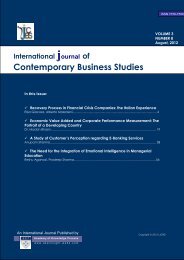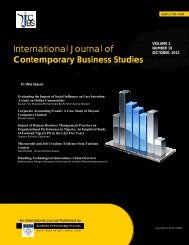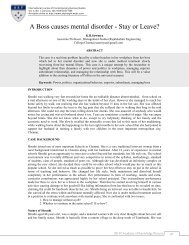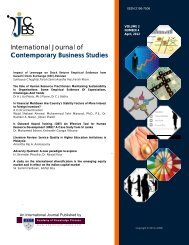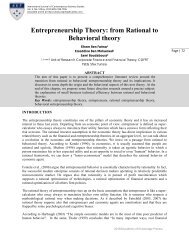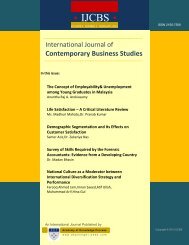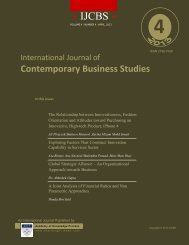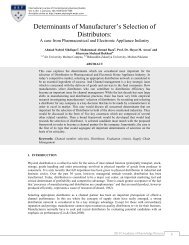International journal of Contemporary Business Studies
International journal of Contemporary Business Studies
International journal of Contemporary Business Studies
Create successful ePaper yourself
Turn your PDF publications into a flip-book with our unique Google optimized e-Paper software.
<strong>International</strong> Journal <strong>of</strong> <strong>Contemporary</strong> <strong>Business</strong> <strong>Studies</strong><br />
Vol: 3, No: 6. June, 2012 ISSN 2156-7506<br />
Available online at http://www.akpinsight.webs.com<br />
factors and achieve competitive advantage (Mia & Clarke, 1999).Similarly, Shields & Shields<br />
(1998) find that in situations <strong>of</strong> low competitiveness, decisions become more routine. In these<br />
circumstances, the decisions <strong>of</strong> leaders themselves as the obvious solutions and considered<br />
wasteful <strong>of</strong> time. Therefore, these managers are less satisfied in their mission if they become<br />
involved in the preparation <strong>of</strong> budgets. Therefore, one can conclude that under conditions <strong>of</strong> low<br />
competitiveness, managers will be less incentive to participate in the process <strong>of</strong> preparing the<br />
budget (Powell, 1992).<br />
It is possible that a high level <strong>of</strong> participation is inconsistent with the organizational structure and<br />
business environment; this is due to a low level <strong>of</strong> performance (due to wasted time and effort <strong>of</strong><br />
managers) and dissatisfaction at work. In another side, if the intensity <strong>of</strong> competitiveness is<br />
strong, managers may need additional information relevant to the complexities <strong>of</strong> the external<br />
market environment (Brownell, 1983; Kren, 1992; Tsui, 2001). The works <strong>of</strong> Kren (1992) and<br />
Chong & Chong (2002b) show that budgetary participation provides a convenient opportunity<br />
for leaders to gather relevant information to make informed decisions. Thus we assume that a<br />
high level <strong>of</strong> competitive market, managers participating in the budget process, seeking more<br />
information. This opportunity allows them to increase their satisfaction because their<br />
participation is a tool to express their values (Shields & Shields, 1998, p. 59).<br />
Hence, the first hypothesis could be formulated as follows:<br />
Hypothesis 1: The direct effect <strong>of</strong> budgetary participation on organizational performance is low.<br />
Both assumptions are made and are based on a literature review using the budgetary participation<br />
as an independent variable, taking a comprehensive approach to this variable (dimensional scale<br />
<strong>of</strong> the variable budgetary participation). However, in seeking to identify the true extent <strong>of</strong><br />
participation that influences organizational performance in the presence <strong>of</strong> competitive<br />
conditions (high or low), we adopt a more dimensional approach to the budgetary participation<br />
(Hassel & Cunningham, 1993, 1996; Chong & al., 2005).The dimension "involvement" <strong>of</strong><br />
budgetary participation is defined as the extent <strong>of</strong> information exchanged between managers<br />
regarding the factors affecting their budget. While the dimension "influence" means the level <strong>of</strong><br />
influence on manager for the determination <strong>of</strong> his budget (Hassel & Cunningham, 1993, 1996).<br />
Given the bi-dimensionality <strong>of</strong> the budgetary participation, we make the following assumptions:<br />
Hypothesis 2: There is a positive relationship between the dimension "involvement" <strong>of</strong> budgetary<br />
participation and organizational performance when there is a high level <strong>of</strong> competitiveness.<br />
Hypothesis 3: There is a positive relationship between the dimension "influence" <strong>of</strong> budgetary<br />
participation and organizational performance <strong>of</strong> the company when there is a high level <strong>of</strong><br />
competitiveness.<br />
3. RESEARCH METHODOLOGY<br />
3.1. Data collection and sample characteristics<br />
This study employed a questionnaire survey method to collect data. A sample was composed<br />
from 89 top managers from companies in the industrial sector.The administration <strong>of</strong> the survey<br />
questionnaire consisted <strong>of</strong> the following steps. First, a questionnaire with a cover letter<br />
explaining the objective <strong>of</strong> the study and a reply paid self-addressed envelope were mailed to<br />
Copyright © 2012. Academy <strong>of</strong> Knowledge Process<br />
40



